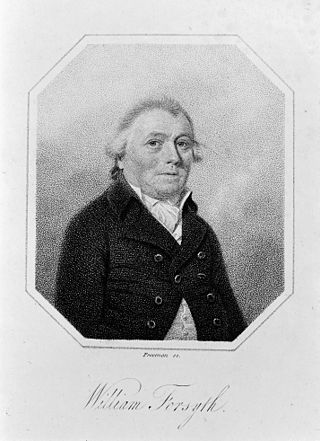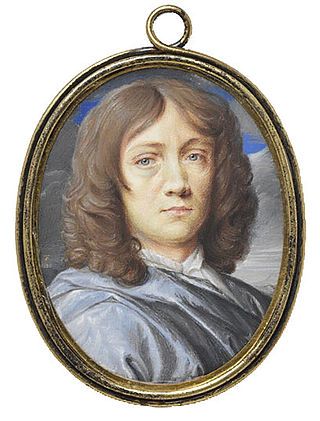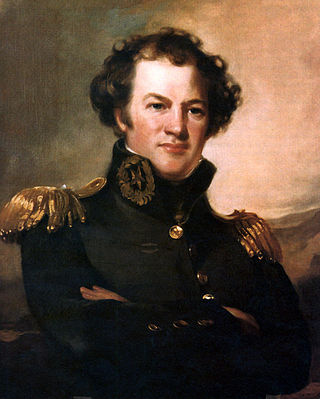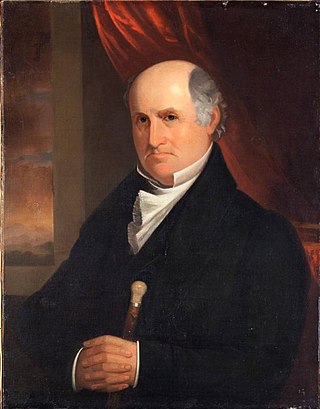
Alexander Chalmers was a Scottish writer.

George Chalmers was a Scottish antiquarian and political writer.

Thomas Chalmers, was a Scottish minister, professor of theology, political economist, and a leader of both the Church of Scotland and of the Free Church of Scotland. He has been called "Scotland's greatest nineteenth-century churchman".

Robert Murray M'Cheyne was a minister in the Church of Scotland from 1835 to 1843. He was born at Edinburgh on 21 May 1813, was educated at the university and at the Divinity Hall of his native city, and was assistant at Larbert and Dunipace. A mission of inquiry among the Jews throughout Europe and in Palestine, and a religious revival at his church in Dundee, made him feel that he was being called to evangelistic rather than to pastoral work, but before he could carry out his plans he died, on 25 March 1843. McCheyne, though wielding remarkable influence in his lifetime, was still more powerful afterwards, through his Memoirs and Remains, edited by Andrew Bonar, which ran into far over a hundred English editions. Some of his hymns became well known and his Bible reading plan is still in common use.

Lives of the Most Eminent English Poets (1779–81), alternatively known by the shorter title Lives of the Poets, is a work by Samuel Johnson comprising short biographies and critical appraisals of 52 poets, most of whom lived during the eighteenth century. These were arranged, approximately, by date of death.

William Forsyth was a Scottish botanist. He was a royal head gardener and a founding member of the Royal Horticultural Society. A genus of flowering plants, Forsythia, is named in his honour.

Thomas Flatman was an English poet and miniature painter. There were several editions of his Poems and Songs (1674). One of his self-portraits is in the Victoria and Albert Museum. A portrait of Charles II is in the Wallace Collection, London. His miniatures are noted for their vitality.

Alexander Macomb was the Commanding General of the United States Army from May 29, 1828, until his death on June 25, 1841. Macomb was the field commander at the Battle of Plattsburgh during the War of 1812 and, after the stunning victory, was lauded with praise and styled "The Hero of Plattsburgh" by some of the American press. He was promoted to Major General for his conduct, receiving both the Thanks of Congress and a Congressional Gold Medal.
William Cave was an English divine and patristic scholar.

John Rutherfurd was an American politician and land surveyor. He represented New Jersey in the United States Senate from 1791 to 1798.
Groom of the Robes is an office in the Royal Household of the Sovereign of England. In 1953, the Groom of the Robes to Elizabeth II had the task of bringing forward the robes and other items of ceremonial clothing worn by the monarch at various points in the coronation service, ready to hand them over to the Mistress of the Robes and the Lord Great Chamberlain and to receive and remove those which were no longer required.

A biography, or simply bio, is a detailed description of a person's life. It involves more than just basic facts like education, work, relationships, and death; it portrays a person's experience of these life events. Unlike a profile or curriculum vitae (résumé), a biography presents a subject's life story, highlighting various aspects of their life, including intimate details of experience, and may include an analysis of the subject's personality.
John Lauris Blake was an American clergyman and bestselling author. He is best known as the author of the General Biographical Dictionary.

The New American Cyclopædia was an encyclopedia created and published by D. Appleton & Company of New York in 16 volumes, which initially appeared between 1858 and 1863. Its primary editors were George Ripley and Charles Anderson Dana.

Henry Howe was an American author who wrote histories of several states in the United States. His most celebrated work is the three volume Historical Collections of Ohio.
The General Biographical Dictionary was a bestselling book of the early 19th century, compiled by British author Alexander Chalmers. It is the work on which Chalmers' fame as a biographer mainly rests.
General Biographical Dictionary may refer to:

Franciscus à Mesgnien Meninski (1623–1698) was the author of a multi-volume Turkish-to-Latin dictionary and grammar of the Turkish language, first published in 1680, which was ground-breaking in its comprehensiveness at the time, and for historians and linguists today it is a valuable reference for the Turkish language of the early modern period.
John Christopher Sturmius (1635–1703) was a 17th-century German mathematician.













